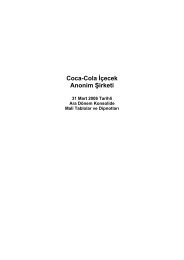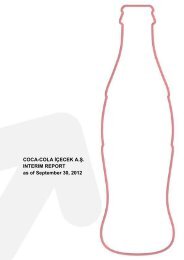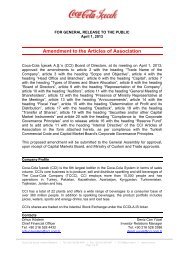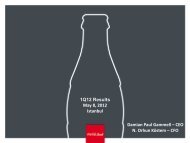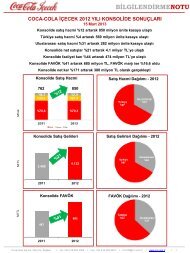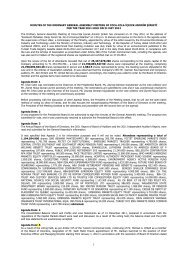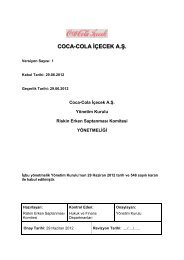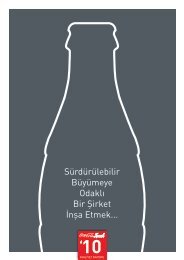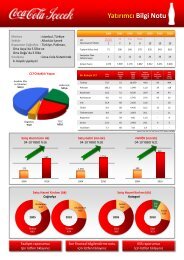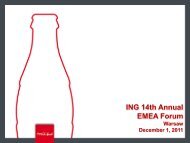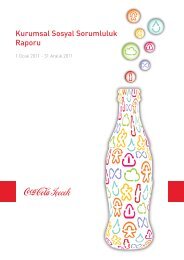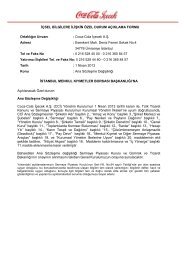quarters. Bad weather conditions, including unusually cold or rainy periods, in any of our markets or decreased levels of tourismin Turkey during the peak season could adversely affect sales volume, profit from operations and cash flow and could thereforehave a disproportionate impact on our operating results for the entire year.We also experience increased demand for our beverages during Ramadan, which is the holy month of fasting in theIslamic calendar. The dates of Ramadan are determined according to a lunar calendar, meaning that Ramadan generally occurs10 days earlier each year.Exchange RatesWe report our financial results in New Turkish Lira. We have foreign currency denominated revenues, expenses, assetsand liabilities. As a consequence, movements in exchange rates can affect our profitability, the comparability of our resultsbetween periods and the carrying value of our assets and liabilities.Our revenues are generated in the local currencies of the countries in which we operate. When we incur expenses thatare not denominated in the same currency as the related revenues, foreign exchange rate fluctuations could affect ourprofitability. Raw materials purchased in currencies such as the U.S. dollar can lead to higher cost of sales if those currenciesstrengthen against the local currencies in which revenues are generated, which, if not recovered through price increases, wouldlead, in turn, to a reduction in our gross profit margins. In 2003, 2004 and 2005, 44.7%, 46.1% and 45.0%, respectively, of ourpurchases of raw and packaging materials were denominated in U.S. dollars. As of December 31, 2005, the cost of all of ourconcentrate, which represented 39.5% of our raw material costs in 2005, was denominated in U.S. dollars. Since 2002, The<strong>Coca</strong>-<strong>Cola</strong> Company has determined concentrate prices for most of our CSDs in Turkey by reference to a percentage of our U.S.dollar net sales as calculated in accordance with U.S. GAAP, which has had the effect of hedging these concentrate pricesagainst possible devaluations of the Turkish Lira. With respect to our international operations, The <strong>Coca</strong>-<strong>Cola</strong> Company has seta fixed price in U.S. dollars for concentrate and our expenses for PET resin, sugar, glass bottles and cans are denominated inU.S. dollars.In addition, even where revenues and expenses are matched, we must translate non-New Turkish Lira denominatedresults of operations, assets and liabilities into New Turkish Lira in our consolidated financial statements. To do so, balancesheet items are translated from their source currency into New Turkish Lira using fiscal year-end exchange rates and incomestatement and cash flow items are translated into New Turkish Lira using average exchange rates during the relevant period.Consequently, increases and decreases in the value of the New Turkish Lira versus the currencies used by our internationaloperations will affect our reported results of operations and the value of our assets and liabilities in our consolidated balancesheet, even if our results of operations or the value of those assets and liabilities has not changed in their original currency. Thesetranslations could significantly affect the comparability of our results between financial periods or result in significant changes tothe carrying value of our assets, liabilities and shareholders' equity.Impact of InflationExchange rates for the New Turkish Lira can be highly volatile. Although until February 2001 it was the stated policyof the Central Bank of the Republic of Turkey to devalue the Turkish Lira in line with inflation, in recent years the devaluationof the Turkish Lira has not been consistent with inflation rates. The annual inflation rates in Turkey as measured by the averagepercentage changes in the Turkish consumer price index for 2000, 2001, 2002, 2003, 2004 and 2005 were 64.9%, 54.9%, 54.4%,45.0%, 25.3%, 8.6% and 8.2%, respectively. Historically, we have been able to increase our local currency selling pricesapproximately in line with inflation in each of these years. See "Risk Factors—Risks Relating to Operating in Turkey—Thelevel of inflation in Turkey could adversely affect our business" and " —Application of IAS 29."TaxationUnder the Turkish Taxation Code, a company that has its head office or place of business in Turkey is subject to acorporate tax that is levied at a rate of 30% on the corporation's taxable income. During the fiscal years ended December 31,2001 and 2002, corporations were also obligated to make a mandatory contribution to the Turkish state funds equal to 10% ofcorporate taxes, resulting in an overall effective tax rate for these corporations of 33% for 2001 and 2002, compared to aneffective tax rate of 30% for fiscal 2003. For fiscal year 2004 only our statutory financial statements were required to be adjustedto account for the effects of inflation, but they continued to be prepared on an unconsolidated basis.In addition, the Turkish government offers investment incentives to companies that make certain qualifying capitalinvestments in Turkey. Prior to April 24, 2003, the total amount of qualifying capital investments was deducted from taxableincome and the remainder of taxable income, if any, was taxed at the corporate tax rate. A withholding tax of 19.8% was applied
to the total amount of qualifying capital investments. With effect from April 24, 2003, the investment incentives scheme wasamended such that companies are no longer subject to a withholding tax, but rather directly deduct 40% of qualifying capitalinvestments from their annual taxable income. In addition, corporations that had unused qualifying capital investment amountsfrom periods prior to April 24, 2003 were entitled to carry them forward and apply the 19.8% withholding tax to them in themanner described above.In accordance with the Turkish Taxation Code, CCI, CCSD and Efes Invest file separate tax returns. CCI appliedinvestment incentive certificates to its entire taxable income in 2001, 2002 and 2003 and, as a result, its tax rate based on itsstatutory financial statements in those years was 19.8%. As of December 31, 2004, CCI had remaining certificates in an amountof approximately YTL46.0 million, which is indexed annually based on the specific rates announced by the government. As ofDecember 31, 2005, CCI had utilized all of the investment incentive certificates under the old regime and had started utilizingthe investment incentive entitlements under the new regime. As of December 31, 2005, CCI had remaining entitlements in anamount of approximately YTL13.9 million. Remaining entitlements will continue to be applied against net income as reported inthe statutory financial statements of CCI until they have been fully utilized. CCI's tax rate based on its statutory financialstatements was 8.2% in 2005. CCSD applied all of its investment incentive entitlements under the new regime to part of itstaxable income in 2003. CCSD's tax rate based on its statutory financial statements was 26.9% in 2003, 28.7% in 2004 and25.3% in 2005. The lower than statutory rate in 2003, 2004 and 2005 was due to the utilization of all the investment taxincentives obtained after April 24, 2003 against CCSD's taxable income.We have traditionally benefited from certain Turkish corporate tax incentives, particularly incentives related to capitalinvestments. Under the draft corporate tax code (the "Draft Corporate Tax Code") that is expected to be implemented inMay 2006 with a retroactive effective date of January 1, 2006, the corporate tax rate in Turkey will be reduced from the currentrate of 30% to 20% but tax incentives for capital investments will no longer be available. The Draft Corporate Tax Code permitsus to elect to follow either the old or the new regime with respect to 2006. As a result, we may be able to use our remainingcapital investment incentives in 2006 if we have sufficient qualifying income; however, our overall effective tax rate in 2006 andthereafter may increase.The amount of income tax we incur is calculated based on the taxable income reported in our Turkish statutoryaccounts rather than on our IFRS income before tax. Accordingly, our IFRS income before tax may change without there beingany corresponding change in our IFRS income tax. If that happens, our effective tax rate for IFRS purposes will be affected.Tax Amnesty Law No. 4811, published on February 27, 2003, provided companies with the option of increasing theirtaxable income in exchange for the assurance of immunity from tax inspection and additional assessments for corporate incometaxes with respect to the years 1998 to 2001. CCI and CCSD availed themselves of this option and increased their total taxespayable with respect to the years 1998 to 2001 by YTL845, 694, of which YTL563,796 was paid in 2003 and the remainingamount was paid in July 2004.As of December 31, 2003, 2004 and 2005, Efes Invest had cumulative loss carryforwards of $5.3 million(YTL7.4 million), $20.5 million (YTL27.5 million) and $20.1 million (YTL27.0 million), respectively. Of the total amount as ofDecember 31, 2005, $16.8 million (YTL22.6 million) was available to offset gains. These losses can be carried forward for fiveyears from the date they were incurred.The loss carryforwards held by Efes Invest at the end of 2005 and which were available to offset gains expire asfollows:AmountExpiration(in millions of YTL)0.4............................................................................................................................................................. 20072.1............................................................................................................................................................. 200820.1............................................................................................................................................................ 2009Efes Invest availed itself of the tax amnesty described above and obtained immunity from tax examinations for theseyears. YTL0.1 million of additional corporate tax and VAT are being paid in installments to the local tax offices.CC Kazakhstan is subject to a corporate income tax of 30% on taxable profit as determined under the law ofKazakhstan. Companies are required to file profit tax declarations on a quarterly basis in advance. For the years endedDecember 31, 2003, 2004 and 2005, CC Kazakhstan paid corporate taxes amounting to $1.4 million (YTL2.0 million),$2.5 million (YTL3.4 million), and $0.6 million (YTL0.8 million), respectively.
- Page 1 and 2: OFFERING MEMORANDUM CONFIDENTIAL5,0
- Page 4 and 5: Neither we, the selling shareholder
- Page 7 and 8: ENFORCEABILITY OF CIVIL JUDGMENTSCC
- Page 9 and 10: PRESENTATION OF FINANCIAL AND OTHER
- Page 11 and 12: FORWARD-LOOKING STATEMENTSThis offe
- Page 13 and 14: market in Europe for products of Th
- Page 15 and 16: The OfferingThe International Offer
- Page 17 and 18: corresponding figures for previous
- Page 19 and 20: 2004 and 2005, respectively, and 32
- Page 21 and 22: Sales of alcohol-free beverages are
- Page 23 and 24: Our principal shareholders have the
- Page 25 and 26: integration into the European Union
- Page 27 and 28: part of governmental authorities; a
- Page 29 and 30: of all of the companies with equity
- Page 31 and 32: • the remainder of the net profit
- Page 33 and 34: In February 2005, the SIS substitut
- Page 35 and 36: statutory books is slightly lower t
- Page 37 and 38: 2005 2004 2003(audited)(in thousand
- Page 39 and 40: Minority share ownership...........
- Page 41 and 42: on the consolidated balance sheets.
- Page 43: "Package mix" refers to the relativ
- Page 47 and 48: Xpress in April 2005. These increas
- Page 49 and 50: We had net other expense of YTL12.3
- Page 51 and 52: Marketing and advertising expense i
- Page 53 and 54: Net cash used in investing activiti
- Page 55 and 56: In 2004, the increase in net workin
- Page 57 and 58: upon with the bank on a case-by-cas
- Page 59 and 60: Interest Rate RiskOur interest rate
- Page 61 and 62: We record a valuation allowance to
- Page 63 and 64: Attractive Growth MarketsWe operate
- Page 65 and 66: In June 1996, The Coca-Cola Company
- Page 67 and 68: The following table compares the pe
- Page 69 and 70: have received special authorization
- Page 71 and 72: 2005 2004 2003Unit CaseSales Volume
- Page 73 and 74: The sports drinks segment is a rela
- Page 75 and 76: Indirect DistributionIn addition to
- Page 77 and 78: CC Kazakhstan was established in 19
- Page 79 and 80: CC Kazakhstan's share of the bottle
- Page 81 and 82: We believe that Azerbaijan's demogr
- Page 83 and 84: Piko (2) ..........................
- Page 85 and 86: consolidation in recent years and,
- Page 87 and 88: The following table shows the packa
- Page 89 and 90: "Peak season production capacity" i
- Page 91 and 92: Turkey:Ankara......................
- Page 93 and 94: We intend to explore possible syner
- Page 95 and 96:
and producers and distributors, whi
- Page 97 and 98:
We have implemented systems that we
- Page 99 and 100:
(2) These properties are not curren
- Page 101 and 102:
Our senior management is responsibl
- Page 103 and 104:
Group, Mr. Zorlu worked for Turkish
- Page 105 and 106:
Consistent with our commitment to l
- Page 107 and 108:
Anadolu EfesEstablished in 1966, An
- Page 109 and 110:
Coca-Cola Company may, in its sole
- Page 111 and 112:
distribution or sale of any product
- Page 113 and 114:
certain approved containers of The
- Page 115 and 116:
Resolution the Trade RegistryGazett
- Page 117 and 118:
Class B Shareholders pursuant to wh
- Page 119 and 120:
Notices covering general meetings (
- Page 121 and 122:
In the event any party or parties a
- Page 123 and 124:
AuditorsPursuant to our articles of
- Page 125 and 126:
implementation of the New Turkish L
- Page 127 and 128:
Insider TradingInsider trading is d
- Page 129 and 130:
The Republic of TurkeyThe following
- Page 131 and 132:
Gains from the sale, exchange, or o
- Page 133 and 134:
• certain former citizens or long
- Page 135 and 136:
Subject to the discussion below und
- Page 137 and 138:
In addition, until 40 days after th
- Page 139 and 140:
(1) The purchaser acknowledges that
- Page 141 and 142:
In our opinion, the consolidated fi
- Page 143 and 144:
Coca-Cola İçecek Anonim Şirketi
- Page 145 and 146:
Coca-Cola İçecek Anonim Şirketi
- Page 147 and 148:
a) the restatement for changes in t
- Page 149 and 150:
• Non-monetary assets and liabili
- Page 151 and 152:
The functional currency of Efes Sı
- Page 153 and 154:
Goodwill arising from acquisitions
- Page 155 and 156:
Financial assets and liabilities ar
- Page 157 and 158:
121,424 88,516 78,7545. INVESTMENTS
- Page 159 and 160:
Accumulated Impairment .... (8,123)
- Page 161 and 162:
Management premium /bonus accrual f
- Page 163 and 164:
The legal reserves are not availabl
- Page 165 and 166:
The Group is subject to taxation in
- Page 167 and 168:
The Group's objective is to maintai
- Page 169 and 170:
OtherBeverage Partners Worldwide...
- Page 171 and 172:
Cash and cash equivalents .........
- Page 173 and 174:
Efes Sınai Yatırım Holding Anoni
- Page 175 and 176:
1. CORPORATE INFORMATIONGeneralEfes
- Page 177 and 178:
Trade receivables—net ...........
- Page 179 and 180:
Investments classified as available
- Page 181 and 182:
arising from the business combinati
- Page 183 and 184:
differences will reverse in the for
- Page 185 and 186:
Less impairment for ACCB and Kuban
- Page 187 and 188:
2005 2004Trade accounts payable....
- Page 189 and 190:
2005 2004Net profit attributable to
- Page 191 and 192:
Total depreciation and amortization
- Page 193 and 194:
For the purposes of consolidated fi
- Page 195 and 196:
Political and Economic Environment
- Page 197 and 198:
Credit risk arises from the possibi
- Page 199 and 200:
2004Domestic Foreign Elimination Co
- Page 201 and 202:
Efes Sınai Yatırım Holding Anoni
- Page 203 and 204:
Efes Sınai Yatırım Holding Anoni
- Page 205 and 206:
Dış Ticaret Ltd. Şti.)(*) The li
- Page 207 and 208:
activities. The equity and net inco
- Page 209 and 210:
The Group presents assets subject t
- Page 211 and 212:
Deferred income tax is provided, us
- Page 213 and 214:
2004 2003ACCB......................
- Page 215 and 216:
The effective interest rates at the
- Page 217 and 218:
There have been no other transactio
- Page 219 and 220:
Major components of income tax expe
- Page 221 and 222:
Balances with related parties as of
- Page 223 and 224:
Bishkek CC is subject to corporate
- Page 225 and 226:
The Group does not hedge its foreig
- Page 227 and 228:
ANNEX ASUMMARY OF CERTAIN SIGNIFICA
- Page 229 and 230:
As to U.S. LawAs to Turkish LawWhit



